|
|
|
Sort Order |
|
|
|
Items / Page
|
|
|
|
|
|
|
| Srl | Item |
| 1 |
ID:
145518
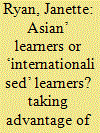

|
|
|
|
|
| Summary/Abstract |
The contemporary context of higher education around the world is characterised by increasing international ‘contacts’ between higher education systems. These include increased ‘flows’ of international students, as well as rapidly growing numbers of academic collaborations through international research partnerships and transnational teaching programmes. Yet, much of the literature on international students tends to focus on how international students, and Chinese students in particular, may lack particular Western academic knowledge and values. Identifying groups as, for example, ‘Asian’, ‘Chinese’ or ‘Confucian culture heritage’ learners runs the risk of stereotyped views of international students and the desirability (for all students) of attaining only ‘Western’ academic knowledge and skills. The rise in the internationalisation of universities around the world has seen not just an increase in international student numbers, but changes to the ‘four Ps’ of higher education: policies, programmes, pedagogy and partnerships. Interestingly, the direction of student flows is beginning to change from mainly ‘east’ to ‘west’, and there is a growing interest in how these interactions can lead to more globalised and intercultural learning outcomes not only just for international students, but also for local students and staff. This article draws on theories of transculturalism, contact theory and the core principles of the UK Higher Education Academy’s Internationalising Higher Education Framework. In the context of the proliferation of universities’ internationalisation policies and the increasing cultural diversity of university staff and student populations, these theories and principles can provide a foundation for examining how increased contact between Western and Asian higher education systems can lead to learning and knowledge outcomes that can better serve individuals and organisations in the current ‘global era’. It reports research that illustrates how academics’ notions of ‘scholarship’ and ‘learning’ in both contexts are either shared or differ and points to how the common academic values can be the basis for mutual understanding, and the differences can be the source of mutual learning.
|
|
|
|
|
|
|
|
|
|
|
|
|
|
|
|
| 2 |
ID:
166089


|
|
|
|
|
| Summary/Abstract |
This article discusses the epistemological issues raised by the internationalisation of the social sciences as they affect the case of students from the People’s Republic of China who are trained in social sciences in France and return to pursue their career in higher education and research in China. The aim is to assess whether the epistemological differences between the two academic worlds may give rise to any professional difficulties in this many-sided scientific socialisation. Although our qualitative enquiry has revealed a number of differences, the problem of the availability of professional opportunities does not seem to have a distinctively epistemological dimension.
|
|
|
|
|
|
|
|
|
|
|
|
|
|
|
|
| 3 |
ID:
144796
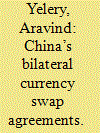

|
|
|
|
|
| Summary/Abstract |
China has recently demonstrated diverse ways to pursue its economic internationalisation. The trade mechanism has been re-modelled without a heavy tone on exports and China’s vulnerability to import–export risks has been steadily reduced. More than trade, the investments have been pursued to make Chinese economic expansion endure. Chinese also learned the trick of larger geo-economics by not waiting for crisis to occur and get caught in the global domino effect of slowdown, recession and other impulsive nature of markets. While, on one hand, China is trying to comply by international monetary and legal standards, making more space in a cluttered room for its economic ambitions, on the other, it is also adopting smarter ways to outperform the existing heavyweight economies’ dominance in the sphere of international monetary. An example of China’s sprint for maximising its legal and economic engagement and securing benefits by having bilateral currency swap agreements (BCS), exhibits how China has evolved over the last decade. A decade back, China was apprehensive about the BCS when it did not follow the Chiang Mai initiative. The current commentary attempts to analyse China’s BCS strategy and the possible impact.
|
|
|
|
|
|
|
|
|
|
|
|
|
|
|
|
| 4 |
ID:
114557
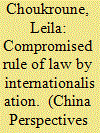

|
|
|
|
|
| Publication |
2012.
|
| Summary/Abstract |
Upon accession to the WTO, China committed to a series of specific obligations often referred to as "WTO+," aimed at the progressive transformation of the Chinese legal landscape. While one cannot ignore a number of very significant achievements as well as a true political responsiveness to other WTO members' concerns, China has not been willing to grasp the WTO opportunity for domestic legal reforms as much as observers, and some Chinese leaders, had hoped for. This incomplete normative revolution now creates tensions between WTO members, as evidenced by an increasing number of disputes shedding a direct light on the lack of transparency in the Chinese legal system. Ten years later, this piece reflects upon predictions about Chinese "rule of law by internationalisation," while putting China's legal reform into a broader political perspective.
|
|
|
|
|
|
|
|
|
|
|
|
|
|
|
|
| 5 |
ID:
183460


|
|
|
|
|
| Summary/Abstract |
Focusing on the conflicts in the Southern Philippines and West Papua, this article uses a framework developed from the literature on the internationalisation of ethnic conflict to suggest insights into international involvement in both conflicts. In both cases there are succinct overviews of the relevant general background to the conflict, and international involvement in particular, followed by a characterisation in terms of typological features that covers motives for involvement, objectives, means of involvement, and impact. Insights into international involvement in the two conflicts can suggest ways in which aspects of the general literature might be developed further, but two cases are insufficient to develop more broad ranging generalisations. A key insight is the way in which specifically political factors can affect the way in which motives for involvement manifest themselves, the significance of Sabah politics in relation to Malaysian involvement in the Southern Philippines, and West Papuan lobbying in the Melanesian countries being cases in point.
|
|
|
|
|
|
|
|
|
|
|
|
|
|
|
|
| 6 |
ID:
082899
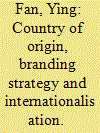

|
|
|
|
|
| Publication |
2008.
|
| Summary/Abstract |
This paper studies the internationalisation of Chinese piano firms from a branding perspective. The purpose of the paper is twofold. First, it examines the interplay between the country of origin (COO) effect and international branding, and how COO affects the choice of branding strategies in international markets. Second, it explores the possible link between international branding decisions and international expansion of the firm. A model is introduced that illustrates the relationships between COO, branding options and internationalisation. Corresponding to its progress in internationalisation, a firm's branding development in international markets may follow certain stages. As the firm moves to advanced stages, it increases its international brand equity; the impact from negative COO will decrease and eventually become irrelevant. The literature on internationalisation is largely based on the experience of MNEs from Western developed countries. Multinational firms from developing countries such as China possess some unique characteristics that make it very difficult to apply Western theories to them. The emergence of MNEs from developing countries calls for the development of new theories.
|
|
|
|
|
|
|
|
|
|
|
|
|
|
|
|
| 7 |
ID:
146694
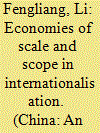

|
|
|
|
|
| Contents |
Globalisation has reached every corner of the world in the 21st century. Recognising this opportunity, China’s official education strategy, “The National Outline for Medium- and Long-Term Educational Reform and Development (2010–2020)”, proposed a series of policies to promote internationalisation of education, including attracting more international students to study in Chinese universities. Although international students can bring benefits to Chinese universities, they inevitably also increase costs. Does recruiting more international students actually influence the cost efficiency of Chinese universities? By employing the flexible fixed cost quadratic function to estimate economies of scale and scope in internationalisation, this article attempts to provide pilot answers to the question. The empirical results suggest that there are both economies of scale and economies of scope in recruiting international students. This suggests that Chinese high-level universities should recruit more international students to align with the national strategy.
|
|
|
|
|
|
|
|
|
|
|
|
|
|
|
|
| 8 |
ID:
141217
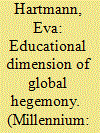

|
|
|
|
|
| Summary/Abstract |
This article seeks to further strengthen a sociological turn within International Relations (IR), which aims to make classical social theory fruitful for analysing the transnationalisation of societies. The focus is on the contribution of Antonio Gramsci’s analysis in this regard. A number of scholars have transferred his theory of hegemony to the global level in order to gain a more sophisticated understanding of global power and its transformation in reaction to the deepening of global economic integration. Surprisingly, most neo-Gramscian scholars have devoted little attention to education, despite the importance Gramsci assigned to this social sphere. The article seeks to overcome this lacuna with a study of the internationalisation of higher education since the end of the Second World War. Against the backdrop of the insights this case study provides, it will suggest some modifications of the neo-Gramscian account of hegemony with a view to taking the sociological turn more seriously, and to deepening our understanding of the social quality and the scale of the emerging postnational hegemony.
|
|
|
|
|
|
|
|
|
|
|
|
|
|
|
|
| 9 |
ID:
189902
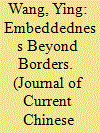

|
|
|
|
|
| Summary/Abstract |
The internationalisation of Chinese non-governmental Organisations (NGOs) is an emerging phenomenon. As new international development actors, how independent are Chinese NGOs from the Chinese state? Based on interviews with eighteen Chinese NGOs and an analysis of secondary sources, the study finds that the internationalisation of Chinese NGOs is variegated rather than solely state-led. The state is not closely involved in much of the internationalisation processes of a majority of Chinese NGOs. However, all Chinese NGOs with overseas operations avoid overstepping a political boundary that is tacitly understood by both NGOs and the state. To explain the duality of both uniformity and diversity among Chinese NGOs, this study develops an embeddedness framework that disaggregates state influences into a primary layer of systemic regulatory guidance that affects all Chinese NGOs, and a secondary layer of influence over NGOs’ operations (initiation, financing, and implementation), within which the varying levels of governmental influence upon different NGOs lie.
|
|
|
|
|
|
|
|
|
|
|
|
|
|
|
|
| 10 |
ID:
120919
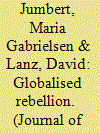

|
|
|
|
|
| Publication |
2013.
|
| Summary/Abstract |
This article is concerned with the rebellion in Darfur as a way to illustrate the politics of insurgency in the era of globalisation. We first show how the Darfur rebels have projected their struggle onto the world stage, before examining the effects that this has engendered. On the one hand, Darfur's global profile solidified the rebels' cause and co-opted international actors in support of it. This translated into real leverage for the rebels, and it constrained the Sudanese government by reducing its ability to use brute force. At the same time, internationalisation encouraged the Darfur rebels to make maximalist demands at the expense of articulating a broader political vision addressing the root causes of conflict. Moreover, the substitution of local legitimacy for international connections lowered the barriers of entry for new groups and thus promoted fragmentation. The combination of these effects makes for intractable conflict scenarios, the current situation in Darfur being a case in point.
|
|
|
|
|
|
|
|
|
|
|
|
|
|
|
|
| 11 |
ID:
112848
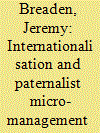

|
|
|
|
|
| Publication |
2012.
|
| Summary/Abstract |
How is the concept of internationalisation (kokusaika) operationalised by Japanese universities? I address this question by examining one university's engagement with the residents of its international student accommodation facility, 'Global House'. I argue that the distinctive combination of benevolence and authoritarianism characterising the university's management of Global House, a combination termed 'paternalism' in this article, can be understood by reference to the obligations assumed by the university as part of its internationalisation agenda. International student presence must be managed strategically because such students are perceived by their universities as both assets and liabilities, and both constituents and externalities. An appreciation of these competing pressures helps to demystify paternalist approaches to international student management observed in Global House. Paternalism appears at first glance to be a dysfunction of the internationalisation process, but it is better understood as an organisational context for the performance thereof. I use this analysis to argue the need to build a stronger conception of the university as a principal protagonist in, rather than simply an object of, internationalisation. This discussion also highlights the importance of developing alternative accounts of internationalisation-ones that are focused more on contextualised descriptions than prescriptive definitions.
|
|
|
|
|
|
|
|
|
|
|
|
|
|
|
|
| 12 |
ID:
154724
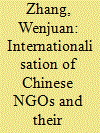

|
|
|
|
|
| Summary/Abstract |
Recent data and policy analysis show that a positive policy and political culture towards non-governmental
organisations (NGOs) have been developed in China which will lay the foundation for the internationalisation
of Chinese NGOs. The changes in global governance, both in terms of a power shift from
Western countries to emerging powers and in terms of the Chinese government’s more assertive role in
global governance, require that Chinese NGOs play a more active role in global affairs. In responding to
the changes, the Chinese government has developed a new strategy on public diplomacy that is expected to
create some political and policy support for Chinese NGOs, especially for grass-roots NGOs’ (G-R NGOs)
internationalisation. However, at this initial stage, the Chinese government and G-R NGOs might not
share the same understanding of the purpose and method of achieving a global role for Chinese NGOs.
Meanwhile, the United Nations (UN) has made many notable efforts to pave the way for engaging with
NGOs. The article argues that the UN platform would be a good starting place for Chinese G-R NGOs’
experimentation with global participation. However, their strategy will determine how far they can go.
|
|
|
|
|
|
|
|
|
|
|
|
|
|
|
|
| 13 |
ID:
110592
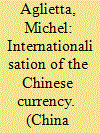

|
|
|
| 14 |
ID:
113975
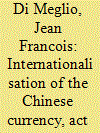

|
|
|
|
|
| Publication |
2012.
|
| Summary/Abstract |
After two waves of important changes in the Chinese system of foreign exchange, one in July 2005, when the Chinese currency was allowed to fluctuate more widely against the US dollar, the other in June 2010, when it was then quoted against an undisclosed basket of currencies, but moreover, was allowed to be partially traded in Hong Kong with the invention of a 'twin', the 'offshore yuan' (CNH), a deep reform could have taken place. The creation of the CNH, allowing debt to be issued internationally in yuan, initially led to the belief that a real set of deep reforms was under way. Yet, like some reforms of the past, which were hesitant or even annulled, the path towards monetary and financial reform is encountering difficulty. The steps taken towards the 'regionalisation' or possibly the 'internationalisation' of the Chinese currency may well be taking the same route. Before the reforms have had time to come to fruition and deliver deep changes, there seems to be some indecisiveness, a sense of relative failure, or at least discovery of the limitations in a process which many, at least at the beginning, believed would be quick and decisive. This article attempts to demonstrate that, like some other Chinese reform processes of the past, the path is not yet very clear and claims of deep changes and unwavering success would be largely premature.
|
|
|
|
|
|
|
|
|
|
|
|
|
|
|
|
| 15 |
ID:
084803
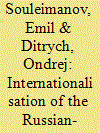

|
|
|
|
|
| Publication |
2008.
|
| Summary/Abstract |
The article provides a critical reading of various related discourses, depicting the political motives behind the conflict in Chechnya as a battlefield of the global jihad. These narratives have sought to present the involvement of external Islamist groups as a major factor in the conflict, and to portray many of the main groups within Chechnya as subscribing to a jihadist ideology. The authors suggest an alternative narrative focusing on the significance of the blood feud in the societies of the North Caucasus. It is argued that it is necessary to differentiate between the radicalisation of the resistance as such and the strengthening of the ideology of jihad. It is concluded that the resistance currently assumes a supranational character, yet one which is delimited regionally rather than globally.
|
|
|
|
|
|
|
|
|
|
|
|
|
|
|
|
| 16 |
ID:
088465
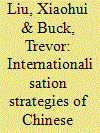

|
|
|
|
|
| Publication |
2009.
|
| Summary/Abstract |
Theories of overseas investment and forms of internationalisation are reconsidered in the face of two exploratory, 'critical instance' case studies collected in China from Lenovo and BOE. The two cases tentatively suggest refinements to conventional OFDI theories that see internationalisation in two important MNEs from China as being driven by factors such as ownership advantages and low labour costs at overseas locations. In terms of entry modes, it would appear that latecomer multinationals from emerging economies may aim to build global strategic linkages, seek new markets and obtain advanced technology, through foreign ventures that are accelerated quickly through entry modes towards acquisitions.
|
|
|
|
|
|
|
|
|
|
|
|
|
|
|
|
| 17 |
ID:
173922


|
|
|
|
|
| Summary/Abstract |
There is a common tendency to observe a process of homogenisation when the current international structure is analysed. However, the globalisation process embraces heterogeneities and contradictions stemming from the integration of different states into a single global structure. This article explores the role and motivations of domestic social classes in creating variations in the form of integration of their states into the global whole. It takes one of the odd cases at the centre of inquiry and particularly concentrates on the emergence of alternative forms to the neoliberal globalisation in the process of Iran’s integration into the global capitalism. The accumulation strategies adopted by the dominant class factions in Iran are investigated in order to reveal their dialectical relationship with the international capitalist structure. Their role in the international political economy of Iran demonstrates how social agents through their strategic activities create variations in the forms of integration into the global capitalism. The article compares the Iranian case to the varieties of integration of lately capitalised but not peripherised BRICS (Brazil, Russia, India, China and South Africa) states. This aims to reveal that whilst these countries have truly integrated into the global capitalist system, the internationalisation of their states contradicts the accumulation strategies of their dominant classes.
|
|
|
|
|
|
|
|
|
|
|
|
|
|
|
|
| 18 |
ID:
120584


|
|
|
|
|
| Publication |
2013.
|
| Summary/Abstract |
The process of internationalisation is exerting pressure on governments around the world to recognise the rights of their indigenous peoples. This article investigates the current legal framework for minority language protection in Japan, where a history of assimilation has threatened the ancestral language and culture of the Ainu minority. The situation in Japan is contextualised within a broader discussion of minority language protection at global and European level in order to better understand the political environment in which a shift in policy for the protection of minority languages has begun. Although the implementation of a new law to promote Ainu culture has led to limited benefits for the Ainu, the fact that Japan continues to deny that the Ainu were colonised and dispossessed of resources acts as a barrier to reconciliation and a way forward. Findings indicate that the processes of internationalisation are conducive to increased international cooperation to promote consensus, greater social inclusion and more opportunity for minorities to participate in political structures. A further significant finding is that an acceptance of diversity and local autonomy can lead to an assurance of human rights.
|
|
|
|
|
|
|
|
|
|
|
|
|
|
|
|
| 19 |
ID:
185499


|
|
|
|
|
| Summary/Abstract |
This article focuses on the stigmatisation of East Asian students within Western universities. This is necessary because East Asian students are often overlooked in existing literature about racism in Western academia. It is argued that East Asian students may be generalised as undesirable students in ways that resonate with more broadly held prejudices about East Asian people. To illustrate this, academic publications about East Asian students are critiqued. This involves identifying, analysing and deconstructing the stereotypes of East Asian students which inadvertently totalise them as homogenous, inadequate and deficient. More specifically, it is argued that East Asian students are often unfairly depicted as: a) lacking critical thinking skills; b) being prone to plagiarism; and c) harming the educational environment. This article introduces the notion of ‘the myth of academic tolerance’ and calls upon academics and universities to actively resist the stigmatisation of East Asian students.
|
|
|
|
|
|
|
|
|
|
|
|
|
|
|
|
| 20 |
ID:
171247
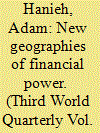

|
|
|
|
|
| Summary/Abstract |
A growing body of critical scholarship has examined the recent growth of Islamic finance (IF), unpacking its ethical assertions and highlighting its close affinities with conventional financial instruments. Receiving less attention, however, is the relationship between the global expansion of IF and the emergence of new financial actors and zones of accumulation. This article situates the evolution of global Islamic circuits alongside processes of capital accumulation in the Gulf Cooperation Council (GCC), arguing that contemporary IF is deeply bound up with the internationalisation of capital groups headquartered in the GCC. This is evident in the internationalisation of GCC Islamic banks, which has given the Gulf a powerful foothold in new markets and a variety of sectors that are typically considered ‘non-financial’. Simultaneously, the expansion and geographical diversification of Islamic debt (sukuk) issuance is refashioning the Gulf’s relationships with other global spaces, a process that looks set to intensify given the widespread push to utilise IF in development financing. Seen from this perspective, the global growth of IF sits in a mutually constitutive relationship with patterns of capital accumulation in the Gulf, as well as the region’s burgeoning weight within (and new linkages to) the global economy.
|
|
|
|
|
|
|
|
|
|
|
|
|
|
|
|
|
|
|
|
|